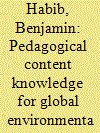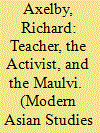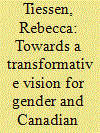|
|
|
Sort Order |
|
|
|
Items / Page
|
|
|
|
|
|
|
| Srl | Item |
| 1 |
ID:
160964


|
|
|
|
|
| Summary/Abstract |
Pedagogical design in international relations and environmental politics needs to help students become active participants in the sustainability transition. This article documents the use of a blog-based assessment activity in an international relations undergraduate course Global Environmental Politics. The activity has a multifunctional design that draws on different forms of pedagogical content knowledge to enhance student learning. These include metacognitive skill development in relation to environmental politics, cultivation of professional networks in the environment and sustainability field, and methods of active participation in the politics of the sustainability transition. Blog-based representations of pedagogical content knowledge can be replicated across international relations curricula.
|
|
|
|
|
|
|
|
|
|
|
|
|
|
|
|
| 2 |
ID:
172864


|
|
|
|
|
| Summary/Abstract |
Exploring the intersection of state, religion, and ethnicity, this article considers the opportunities for individual and collective advancement available to Muslim Gujjars in Chamba district of Himachal Pradesh. Following the lives of three prominent members of the community—a teacher, a political activist, and a maulvi—it considers their respective orientations to the state and their relationships with their fellow Gujjars, to illustrate the different ways in which Gujjars have sought to transcend their marginal and subordinated position as an ethnic and religious minority. With state-promoted schemes of affirmative action and reservation offering only limited opportunities for social and economic advancement, we see how Gujjars have responded to their continued marginalization, first through political mobilization as an ethnic group and, more recently, through the establishment of Islamic educational institutions and association with Tablighi Jama'at. This leads to an evaluation of the emancipatory potentials and contradictions of insurgent citizenship when mobilized around specific aspects of ethnic and religious identity. Against a backdrop of economic liberalization and accompanying shifts in civil society, I show how the distribution of rewards that derive from strategies of assimilation, engagement, and withdrawal are structured in particular ways, including by class and gender.
|
|
|
|
|
|
|
|
|
|
|
|
|
|
|
|
| 3 |
ID:
192926


|
|
|
|
|
| Summary/Abstract |
In this paper, we consider the role of “feminist inside activists” in shaping the Canadian international policy landscape and provide examples of how government employees have actively promoted feminist and gender equality priorities. Specifically, this paper advances our understanding of how policy translates into action, and the transformative potential of agents of change in gender equality and feminist policy-making within Canada’s international policy machinery. Building on studies that identify the significant contributions of mid-level government employees who fight to keep gender equality a priority in government programming, we explore these contributions in the context of inside activism, documenting the significance of the work of both senior and mid-level government officials in advancing feminist policies and priorities. As an agency-focused analysis, this study complements and builds on critical feminist analyses of structural and systemic inequality.
|
|
|
|
|
|
|
|
|
|
|
|
|
|
|
|
| 4 |
ID:
100771


|
|
|
|
|
| Publication |
2010.
|
| Summary/Abstract |
Interest in deliberative theories of democracy has grown tremendously among political theorists, political scientists, activists, and even government officials. Many scholars, however, are skeptical that it is a practically viable theory, even on its own terms. They argue (inter alia) that most people dislike politics and that deliberative initiatives would amount to a paternalistic imposition. Using two large national samples investigating people's hypothetical willingness to deliberate and their actual participation in response to a real invitation to deliberate with their member of Congress, we find that (1) willingness to deliberate in the United States is much more widespread than expected, and (2) it is precisely those people less likely to participate in traditional partisan politics who are most interested in deliberative participation. They are attracted to such participation as a partial alternative to "politics as usual."
|
|
|
|
|
|
|
|
|
|
|
|
|
|
|
|
|
|
|
|
|